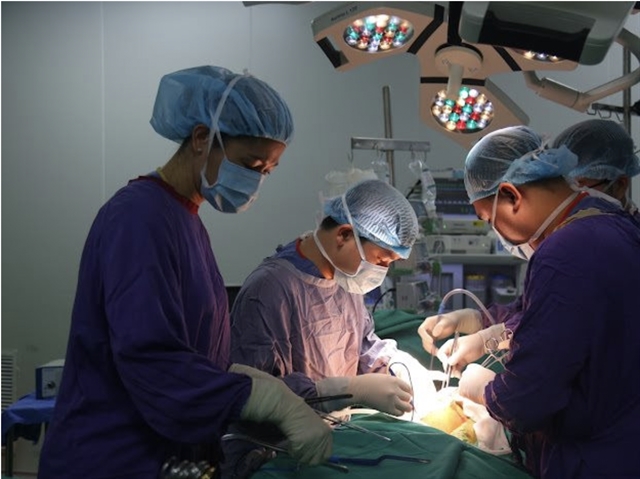 |
| Doctors at Hà Nôị’s Việt Nam-Germany Hospital perform a transplant with an organ harvested from a brain-dead donor. — Photo hanoimoi.vn |
HÀ NỘI — Only around 10 brain-dead people in Việt Nam donate organs every year, the lowest rate in the world, according to the National Coordination Centre for Organ Transplants.
This number is equal to 1 in 110 compared to Korea and 1 in 500 compared to Spain.
At the inaugural ceremony for a branch of the Việt Nam Tissue and Organ Donation Campaign Association last week at Việt Nam-Germany Hospital in Hà Nội, Associate Prof., Dr Đồng Văn Hệ, the centre’s director, said organ and tissue transplant is an important task, especially for patients with chronic and fatal conditions like kidney failure and liver, heart, bone marrow, and corneal damage.
Successfully performing organ transplants from brain-dead donors provides the opportunity to save many people’s lives, he said.
But in Việt Nam, with a population of 100 million, only 10 brain-dead people donate organs each year, the lowest in the world, he said.
Nguyễn Thị Kim Tiến, a former minister of health and president of the Việt Nam Tissue and Organ Donation Campaign Association, said this translates to just 0.1 per million while globally the rate is much higher.
Việt Nam’s organ transplant technology is on par with that of the world, but the organ donation “map” of the world and Southeast Asia does not include Việt Nam, indicating its integration in this regard is still limited, she said.
“We are amending the Law on Human Organ and Tissue Donation and Transplantation and Body Donation to make it more favourable for organ donation.”
Some 78,000 people have registered to donate tissues and organs after death or brain death, but the law has shortcomings that prevent the harvest of their organs.
Even if a person registers as an organ donor, their family members do not permit doctors to harvest their organs after their death, Dr. Dương Đức Hùng, director of Việt Đức Hospital, said.
At Việt Nam-Germany Hospital alone, around 300 people die of traumatic brain injuries in a year, a very large number, he said.
A brain-dead person can save the lives of eight other people by donating organs, he added.
To increase the donation rate, experts said there should be co-ordination between hospitals’ resuscitation units and social work departments to persuade family members.
Doctors could explain the patient’s condition and the social workers could advocate for organ donation, they said.
As of October last year, in 31 years of performing transplants and 13 years of harvesting organs from brain-dead donors, less than 8,000 transplants had been done, with only 500 involving dead and brain-dead people.
The country has 25 organ transplant centres, but Việt Nam-Germany Hospital has performed 25 per cent of all transplants so far. — VNS
- Reduce Hair Loss with PURA D’OR Gold Label Shampoo
- Castor Oil Has Made a “Huge” Difference With Hair and Brow Growth
- Excessive hair loss in men: Signs of illness that cannot be subjective
- Dịch Vụ SEO Website ở Los Angeles, CA: đưa trang web doanh nghiệp bạn lên top Google
- Nails Salon Sierra Madre
 VnExpress News The News Gateway of Vietnam
VnExpress News The News Gateway of Vietnam





